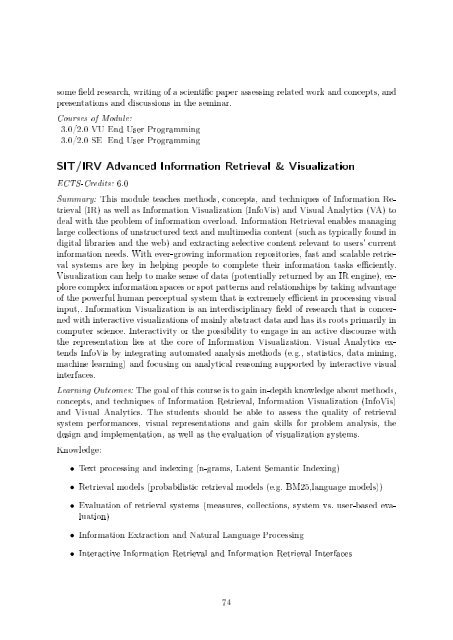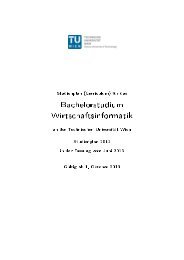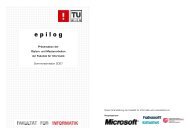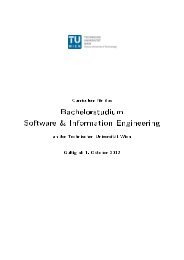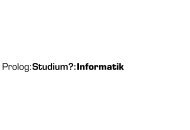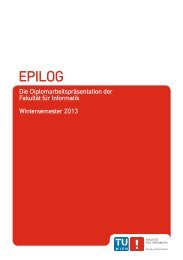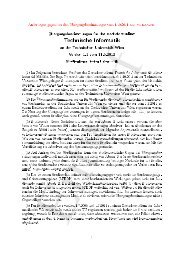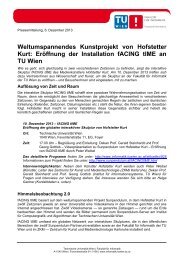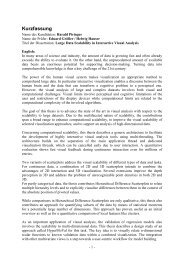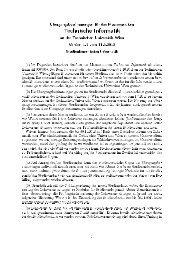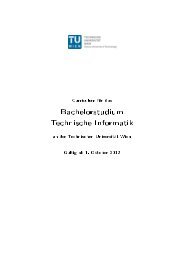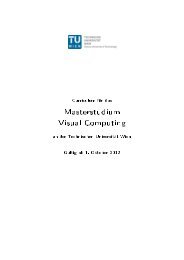Masterstudium Business Informatics - Fakultät für Informatik, TU Wien
Masterstudium Business Informatics - Fakultät für Informatik, TU Wien
Masterstudium Business Informatics - Fakultät für Informatik, TU Wien
Create successful ePaper yourself
Turn your PDF publications into a flip-book with our unique Google optimized e-Paper software.
some eld research, writing of a scientic paper assessing related work and concepts, and<br />
presentations and discussions in the seminar.<br />
Courses of Module:<br />
3.0/2.0 VU End User Programming<br />
3.0/2.0 SE End User Programming<br />
SIT/IRV Advanced Information Retrieval & Visualization<br />
ECTS-Credits: 6.0<br />
Summary: This module teaches methods, concepts, and techniques of Information Retrieval<br />
(IR) as well as Information Visualization (InfoVis) and Visual Analytics (VA) to<br />
deal with the problem of information overload. Information Retrieval enables managing<br />
large collections of unstructured text and multimedia content (such as typically found in<br />
digital libraries and the web) and extracting selective content relevant to users' current<br />
information needs. With ever-growing information repositories, fast and scalable retrieval<br />
systems are key in helping people to complete their information tasks eciently.<br />
Visualization can help to make sense of data (potentially returned by an IR engine), explore<br />
complex information spaces or spot patterns and relationships by taking advantage<br />
of the powerful human perceptual system that is extremely ecient in processing visual<br />
input,. Information Visualization is an interdisciplinary eld of research that is concerned<br />
with interactive visualizations of mainly abstract data and has its roots primarily in<br />
computer science. Interactivity or the possibility to engage in an active discourse with<br />
the representation lies at the core of Information Visualization. Visual Analytics extends<br />
InfoVis by integrating automated analysis methods (e.g., statistics, data mining,<br />
machine learning) and focusing on analytical reasoning supported by interactive visual<br />
interfaces.<br />
Learning Outcomes: The goal of this course is to gain in-depth knowledge about methods,<br />
concepts, and techniques of Information Retrieval, Information Visualization (InfoVis)<br />
and Visual Analytics. The students should be able to assess the quality of retrieval<br />
system performances, visual representations and gain skills for problem analysis, the<br />
design and implementation, as well as the evaluation of visualization systems.<br />
Knowledge:<br />
• Text processing and indexing (n-grams, Latent Semantic Indexing)<br />
• Retrieval models (probabilistic retrieval models (e.g. BM25,language models))<br />
• Evaluation of retrieval systems (measures, collections, system vs. user-based evaluation)<br />
• Information Extraction and Natural Language Processing<br />
• Interactive Information Retrieval and Information Retrieval Interfaces<br />
74


